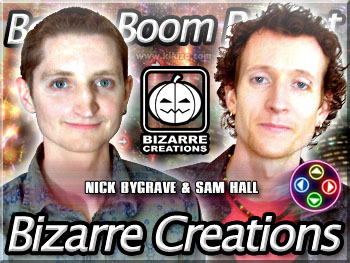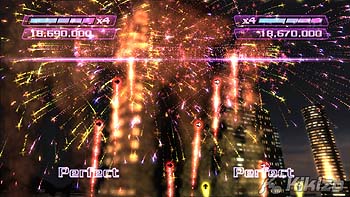Bizarre Creations Interview
We get the inside story on the new must-have game for Xbox Live Arcade, Boom Boom Rocket, directly from the creators at Bizarre Creations.
By Adam Doree
We recently took some time out with our friends at Bizarre Creations, this time with programmer Sam Hall and lead audio programmer Nick Bygrave, to get a detailed inside view on the company's latest project - Boom Boom Rocket.

British developer Bizarre Creations, the creator of the Project Gotham Racing series, was also behind the first hit Xbox Live Arcade game, Geometry Wars Retro Evolved. Now the company is giving it another go, only this time for EA.
The game is a mix of music and fireworks - literally. You time pyrotechnic explosions to 10 original songs created just for the game while moving through a virtualized city. The better your timing is, the prettier the explosions.
The game was originally conceived by designers at Pogo, EA's mainstream-friendly casual games label, and the task was handed to Bizarre to bring the idea to reality - a task the dev house has carried out with its trademark style style. We sat down with Nick and Sam to get the latest gossip from Bizarre.
![]()
Kikizo: Can you tell us a bit about how this new rhythm action project first got started at Bizarre Creations?
Sam Hall: We were approached by EA Pogo with the game idea, and we took the idea and made prototypes from it, and came up with something we think worked really well. So we took it back to Pogo and they were like, yeah this is really cool! So we carried on that way.
Kikizo: Some people have said it's like Fantavision but it's not really, is it?
Nick Bygrave: Visually it is fireworks, set in front of a city backdrop, and in that sense it would be a reasonable assumption to make, but I think once you actually play Boom Boom Rocket it becomes quite quickly apparent that it's a very different type of game. It involves fireworks but that's pretty much where the similarities end.
Sam: Yeah, until you pick the game maybe, but Fantavision is a puzzle game, and our game is pure rhythm action!
Kikizo: So I tried the game on Easy and Medium and avoided Hard! But the difficulty level is quite dynamic, what do you have to take into account when balancing the learning curve?
Sam: Well, the game has to be easy enough for someone's five year-old son, and also has to be difficult enough that the hardcore players aren't going to get bored within ten minutes of playing it - we've tried to strike that balance, and it's been a challenge, hasn't it?
Nick: There has been a lot of playtesting along the way, we've found things that play nicely, and then we try to work out where that's pitched on the different scale, and then make sure that the scale covers enough range basically. A lot of the time it's about just making sure that the easy levels really are accessible enough, but likewise if you're more experienced and you persevere, that there's a lot more that more determined gamers can get fun from.
Sam: I mean, these are levels designed for people that even haven't played games before, to be able to get through to the end of the level, so that they feel they've accomplished something - that was the aim.
Kikizo: Because obviously with things like Geometry Wars, everyone quickly learned how serious gamers were going to be with these simpler titles on Arcade...
Sam: Yeah, the game obviously is a casual game, and Pogo is obviously EA's casual game division, so it was definitely that the game, primarily, needed to be accessible. But we wanted to make sure there's enough depth and challenge for gamers like us. Hopefully we've got a good balance that gives a nice spread of difficulties.
Kikizo: Since this is an EA thing rather than something with Microsoft, is this something that would be appropriate to bring out on the PlayStation Network service for the PS3 as well?
Sam: We can't really comment on that.
Kikizo: But there's no reason why it wouldn't work, hypothetically right?
Sam: Hypothetically...!
Kikizo: I mean, if you've had any experience with PS3 Network so far, would you say there's as much demand for the sort of hardcore competitiveness?
Nick: As yet, we haven't had a chance to work on any PlayStation Network titles. It certainly seems to offer a lot of the same sort of opportunities that Xbox Live Arcade offers, so I would imagine there's a certain type of game that lends itself very well to the platforms.
Kikizo: Some players who are colour blind find the colour coordination of these game a major problem, but you have addressed this with arrows as well as colours - was this specifically to address that, or just to make things easier?
Nick: It was partly because, being accessible we wanted people who've never seen a controller to be able to play it. Even for ourselves, it took a while to memorise where all four coloured buttons were positioned, so it made sense in order to be able to play it straight away.
Sam: Something we found in the first playtests was that people literally had to learn the colours of the buttons - it was something else for them to learn and it was like an obstacle in their way, people had to keep looking down at the controller. So we just said, look at the position of the arrow, and push the top one if it's the up arrow! And as soon as they got that, it took that barrier away, and that's why we default the behaviour to the arrows. Some people like it without the arrows though so we try to cater for each player's preference.
Kikizo: Can you comment from a business model point of view, perhaps the way Martyn Chudley [MD at Bizarre] might look at it, what some of the attractive points about publishing on Xbox Live Arcade?
Nick: Well certainly from a creative point of view at least, it offers a certain flexibility that you don't get with a full-blown title, just because of the scale and the amount of people involved, and if outsourcing is factored in, it has to be rigid just for it to work, whereas with a team as small as this one, it can be quite evolutionary. You can come in with an idea you had last night, and it can be in the game in the afternoon, and it will be in the build by the next day! So that kind of fluidity is something that I think only happens with projects of this size, and for this kind of platform.
Sam: It's been refreshing in that sense, because with big commercial games, it's a lot harder to get changes in there, but with Live Arcade games, like Nick says you can just try out an idea and if it works, you can stick with it.
Kikizo: Similarly then, what are your thoughts on the XNA homebrew stuff that they've opened up?
Nick: I think it's great, I mean we're both from sort of bedroom coding, 8- and 16-bit era, and that kind of seemed to fall by the wayside when consoles kind of took over. There wasn't really as much room for somebody to make something potentially commercial, as easily in their bedroom. With XNA [Game Studio Express] and other similar ideas, I think things have opened up for small teams again. It's back to the level where you can just have a great game idea, and with a couple of your mates, theoretically you can put something together that will rival all the big fellas.
Sam: It's a good idea. I mean, if one great game of it, it's worth it in my eyes.













 Satoru Iwata Video Interview - the late Nintendo president spoke with Kikizo in 2004 as 'Nintendo Revolution' loomed.
Satoru Iwata Video Interview - the late Nintendo president spoke with Kikizo in 2004 as 'Nintendo Revolution' loomed. Kaz Hirai Video Interview - the first of Kikizo's interviews with the man who went on to become global head of Sony.
Kaz Hirai Video Interview - the first of Kikizo's interviews with the man who went on to become global head of Sony. Ed Fries Video Interview - one of Xbox's founders discusses an epic journey from Excel to Xbox.
Ed Fries Video Interview - one of Xbox's founders discusses an epic journey from Excel to Xbox. Yu Suzuki, the Kikizo Interview - we spend time with one of gaming's most revered creators.
Yu Suzuki, the Kikizo Interview - we spend time with one of gaming's most revered creators. Tetris - The Making of an Icon: Alexey Pajitnov and Henk Rogers reveal the fascinating story behind Tetris
Tetris - The Making of an Icon: Alexey Pajitnov and Henk Rogers reveal the fascinating story behind Tetris Rare founders, Chris and Tim Stamper - their only interview? Genuinely 'rare' sit down with founders of the legendary studio.
Rare founders, Chris and Tim Stamper - their only interview? Genuinely 'rare' sit down with founders of the legendary studio. The History of First-Person Shooters - a retrospective, from Maze War to Modern Warfare
The History of First-Person Shooters - a retrospective, from Maze War to Modern Warfare